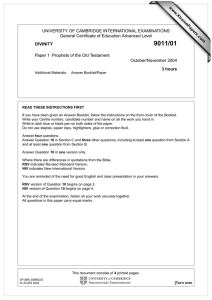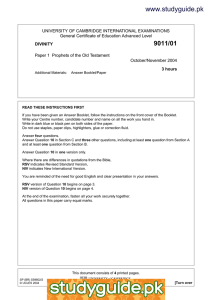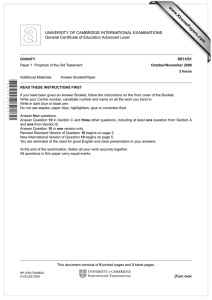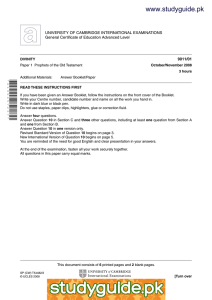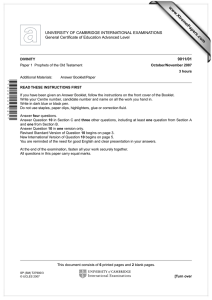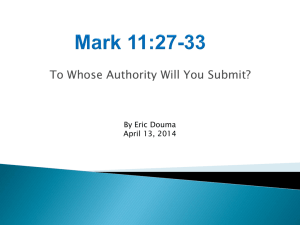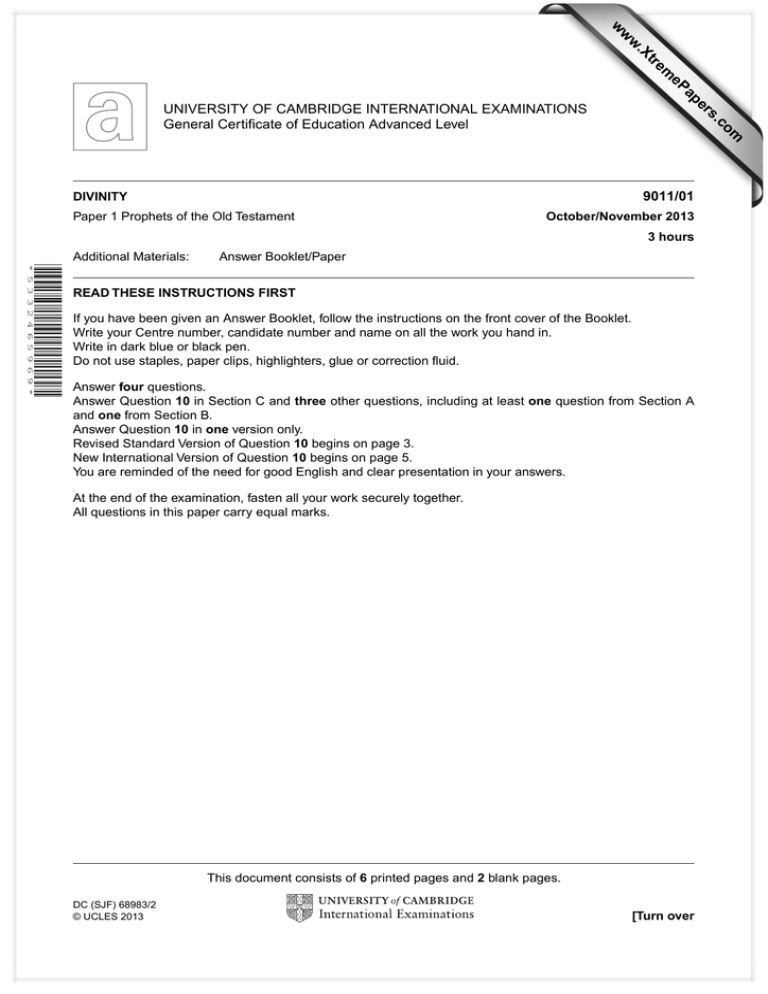
w
w
ap
eP
m
e
tr
.X
w
om
.c
s
er
UNIVERSITY OF CAMBRIDGE INTERNATIONAL EXAMINATIONS
General Certificate of Education Advanced Level
9011/01
DIVINITY
Paper 1 Prophets of the Old Testament
October/November 2013
3 hours
Additional Materials:
Answer Booklet/Paper
* 5 3 3 2 4 6 5 9 6 9 *
READ THESE INSTRUCTIONS FIRST
If you have been given an Answer Booklet, follow the instructions on the front cover of the Booklet.
Write your Centre number, candidate number and name on all the work you hand in.
Write in dark blue or black pen.
Do not use staples, paper clips, highlighters, glue or correction fluid.
Answer four questions.
Answer Question 10 in Section C and three other questions, including at least one question from Section A
and one from Section B.
Answer Question 10 in one version only.
Revised Standard Version of Question 10 begins on page 3.
New International Version of Question 10 begins on page 5.
You are reminded of the need for good English and clear presentation in your answers.
At the end of the examination, fasten all your work securely together.
All questions in this paper carry equal marks.
This document consists of 6 printed pages and 2 blank pages.
DC (SJF) 68983/2
© UCLES 2013
[Turn over
2
Section A
Answer at least one question from this section.
Prophecy in general and Pre-canonical Prophets
1
Examine the claim that true prophets had nothing to do with the cult.
[25]
2
‘Moses was more than a prophet.’ Discuss.
[25]
3
Assess the importance of symbolic acts in the work of the prophets.
[25]
4
‘Without Samuel, prophecy would never have begun; without Elijah, prophecy would have died.’
How far do you agree?
[25]
5
Discuss the relationship between prophets and kings.
[25]
Section B
Answer at least one question from this section.
Pre-exilic Prophets, with special reference to Amos, Hosea, Isaiah of Jerusalem and Jeremiah
6
‘Amos was more a prophet of doom than a prophet of social justice.’ Discuss.
[25]
7
How far was Hosea’s marriage an experience of God’s grace?
[25]
8
‘We see more of his personality than of any other prophet.’ Discuss this claim in connection with
the work and message of Jeremiah.
[25]
9
Discuss the importance of the call to prophesy in the work of the pre-exilic prophets.
© UCLES 2013
9011/01/O/N/13
[25]
3
Section C
Answer Question 10 in one version only.
REVISED STANDARD VERSION
10 Comment on points of interest or difficulty in four of the following passages (wherever possible
answers should refer to the context of the passage but should not retell the story from which the
passage is taken):
[25]
(a) Now two men remained in the camp, one named Eldad, and the other named Medad, and the
spirit rested upon them; they were among those registered, but they had not gone out to the
tent, and so they prophesied in the camp. And a young man ran and told Moses, “Eldad and
Medad are prophesying in the camp.”
(Numbers 11:26–27)
(b) There was a man of Benjamin whose name was Kish, the son of Abiel, son of Zeror, son of
Becorath, son of Aphiah, a Benjaminite, a man of wealth; and he had a son whose name
was Saul, a handsome young man. There was not a man among the people of Israel more
handsome than he; from his shoulders upward he was taller than any of the people.
(1 Samuel 9:1–2)
(c) Now Samuel had died, and all Israel had mourned for him and buried him in Ramah, his
own city. And Saul had put the mediums and the wizards out of the land. The Philistines
assembled, and came and encamped at Shunem; and Saul gathered all Israel, and they
encamped at Gilboa.
(1 Samuel 28:3–4)
(d) Then the word of the LORD came to Elijah the Tishbite, saying, “Arise, go down to meet Ahab
king of Israel, who is in Samaria; behold, he is in the vineyard of Naboth, where he has gone
to take possession. And you shall say to him, ‘Thus says the LORD, “Have you killed, and also
taken possession?” ’ ”
(1 Kings 21:17–19a)
(e) “Come to Bethel, and transgress;
to Gilgal, and multiply transgression;
bring your sacrifices every morning,
your tithes every three days;
offer a sacrifice of thanksgiving of that which is leavened,
and proclaim freewill offerings,
publish them;
for so you love to do, O people of Israel!”
says the Lord GOD.
(f)
(Amos 4:4–5)
Thus the Lord GOD showed me: behold, a basket of summer fruit. And he said, “Amos, what
do you see?” And I said, “A basket of summer fruit.” Then the Lord GOD said to me,
“The end has come upon my people Israel;
I will never again pass by them.”
(Amos 8:1–2)
© UCLES 2013
9011/01/O/N/13
[Turn over
4
(g) Yet let no one contend,
and let none accuse,
for with you is my contention, O priest.
You shall stumble by day,
the prophet also shall stumble with you by night;
and I will destroy your mother.
My people are destroyed for lack of knowledge;
because you have rejected knowledge,
I reject you from being a priest to me.
And since you have forgotten the law of your God,
I also will forget your children.
(Hosea 4:4–6)
(h) What shall I do with you, O Ephraim?
What shall I do with you, O Judah?
Your love is like a morning cloud,
like the dew that goes early away.
Therefore I have hewn them by the prophets,
I have slain them by the words of my mouth,
and my judgment goes forth as the light.
For I desire steadfast love and not sacrifice,
the knowledge of God, rather than burnt offerings.
(Hosea 6:4–6)
(i)
(j)
For to us a child is born,
to us a son is given;
and the government will be upon his shoulder,
and his name will be called
“Wonderful Counselor, Mighty God,
Everlasting Father, Prince of Peace.”
Of the increase of his government and of peace
there will be no end,
upon the throne of David, and over his kingdom,
to establish it and to uphold it
with justice and with righteousness
from this time forth and for evermore.
The zeal of the LORD of hosts will do this.
(Isaiah 9:6–7)
Thus says the LORD of hosts: “Do not listen to the words of the prophets who prophesy to you,
filling you with vain hopes; they speak visions of their own minds, not from the mouth of the
LORD. They say continually to those who despise the word of the LORD, ‘It shall be well with
you’; and to every one who stubbornly follows his own heart, they say, ‘No evil shall come
upon you.’ ”
For who among them has stood in
the council of the LORD
to perceive and to hear his word,
or who has given heed to his word and listened?
(Jeremiah 23:16–18)
(k) Jeremiah said, “The word of the LORD came to me: Behold, Hanamel the son of Shallum your
uncle will come to you and say, ‘Buy my field which is at Anathoth, for the right of redemption
by purchase is yours.’ ”
(Jeremiah 32:6–7)
© UCLES 2013
9011/01/O/N/13
5
NEW INTERNATIONAL VERSION
10 Comment on points of interest or difficulty in four of the following passages (wherever possible
answers should refer to the context of the passage but should not retell the story from which the
passage is taken):
[25]
(a) However, two men, whose names were Eldad and Medad, had remained in the camp. They
were listed among the elders, but did not go out to the Tent. Yet the Spirit also rested on them,
and they prophesied in the camp. A young man ran and told Moses, “Eldad and Medad are
prophesying in the camp.”
(Numbers 11:26–27)
(b) There was a Benjamite, a man of standing, whose name was Kish son of Abiel, the son of
Zeror, the son of Becorath, the son of Aphiah of Benjamin. He had a son named Saul, an
impressive young man without equal among the Israelites – a head taller than any of the
others.
(1 Samuel 9:1–2)
(c) Now Samuel was dead, and all Israel had mourned for him and buried him in his own town of
Ramah. Saul had expelled the mediums and spiritists from the land. The Philistines assembled
and came and set up camp at Shunem, while Saul gathered all the Israelites and set up camp
at Gilboa.
(1 Samuel 28:3–4)
(d) Then the word of the LORD came to Elijah the Tishbite: “Go down to meet Ahab king of Israel,
who rules in Samaria. He is now in Naboth’s vineyard, where he has gone to take possession
of it. Say to him, ‘This is what the LORD says: Have you not murdered a man and seized his
property?’ ”
(1 Kings 21:17–19a)
(e) “Go to Bethel and sin;
go to Gilgal and sin yet more.
Bring your sacrifices every morning,
your tithes every three years.
Burn leavened bread as a thank-offering
and brag about your freewill offerings –
boast about them, you Israelites,
for this is what you love to do,”
declares the Sovereign LORD.
(f)
(Amos 4:4–5)
This is what the Sovereign LORD showed me: a basket of ripe fruit. “What do you see, Amos?”
he asked.
“A basket of ripe fruit,” I answered.
Then the LORD said to me, “The time is ripe for my people Israel; I will spare them no longer.”
(Amos 8:1–2)
(g) But let no man bring a charge,
let no man accuse another,
for your people are like those
who bring charges against a priest.
You stumble day and night,
and the prophets stumble with you.
So I will destroy your mother –
my people are destroyed from lack of knowledge.
Because you have rejected knowledge,
I also reject you as my priests;
because you have ignored the law of your God,
I will also ignore your children.
© UCLES 2013
9011/01/O/N/13
(Hosea 4:4–6)
[Turn over
6
(h) What can I do with you, Ephraim?
What can I do with you, Judah?
Your love is like the morning mist,
like the early dew that disappears.
Therefore I cut you in pieces with my prophets,
I killed you with the words of my mouth;
my judgments flashed like lightning upon you.
For I desire mercy, not sacrifice,
and acknowledgement of God rather than burnt offerings.
(i)
(j)
For to us a child is born,
to us a son is given,
and the government will be on his shoulders.
And he will be called
Wonderful Counsellor, Mighty God,
Everlasting Father, Prince of Peace.
Of the increase of his government and peace
there will be no end.
He will reign on David’s throne
and over his kingdom,
establishing and upholding it
with justice and righteousness
from that time on and for ever.
The zeal of the LORD Almighty
will accomplish this.
(Hosea 6:4–6)
(Isaiah 9:6–7)
This is what the LORD Almighty says:
“Do not listen to what the prophets are prophesying to you;
they fill you with false hopes.
They speak visions from their own minds,
not from the mouth of the LORD.
They keep saying to those who despise me,
‘The LORD says: You will have peace.’
And to all who follow the stubbornness of their hearts
they say ‘No harm will come to you.’
But which of them has stood in the council of the LORD
to see or to hear his word?
Who has listened and heard his word?
(Jeremiah 23:16–18)
(k) Jeremiah said, “The word of the LORD came to me. Hanamel son of Shallum your uncle is
going to come to you and say, ‘Buy my field at Anathoth, because as nearest relative it is your
right and duty to buy it.’ ”
(Jeremiah 32:6–7)
© UCLES 2013
9011/01/O/N/13
7
BLANK PAGE
© UCLES 2013
9011/01/O/N/13
8
BLANK PAGE
Copyright Acknowledgements:
Scripture quotations marked (RSV) are from the Revised Standard Version of the Bible, copyright © 1946, 1952 and 1971 by the Division of Christian Education
of the National Council of the Churches of Christ in the USA. Used by permission. All rights reserved.
Scripture quotations marked (NIV) are taken from the Holy Bible, New International Version®. NIV®. Copyright © 1973, 1978, 1984 by International Bible Society.
Used by permission. All rights reserved.
Permission to reproduce items where third-party owned material protected by copyright is included has been sought and cleared where possible. Every reasonable
effort has been made by the publisher (UCLES) to trace copyright holders, but if any items requiring clearance have unwittingly been included, the publisher will
be pleased to make amends at the earliest possible opportunity.
University of Cambridge International Examinations is part of the Cambridge Assessment Group. Cambridge Assessment is the brand name of University of
Cambridge Local Examinations Syndicate (UCLES), which is itself a department of the University of Cambridge.
© UCLES 2013
9011/01/O/N/13



